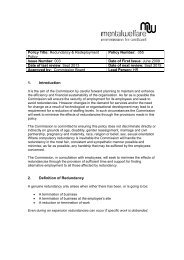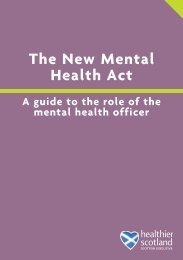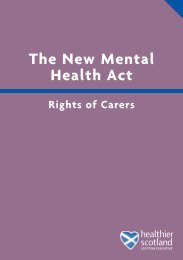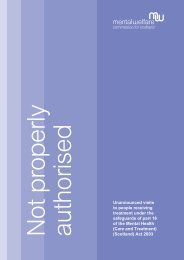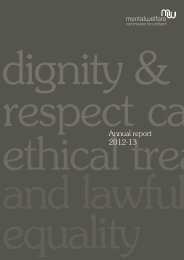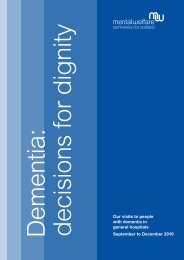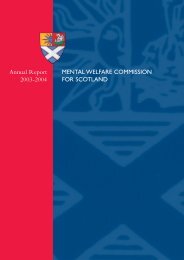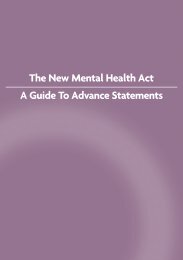The Same as You consultation - Mental Welfare Commission for ...
The Same as You consultation - Mental Welfare Commission for ...
The Same as You consultation - Mental Welfare Commission for ...
Create successful ePaper yourself
Turn your PDF publications into a flip-book with our unique Google optimized e-Paper software.
<strong>The</strong> same <strong>as</strong> you? – Consultation<strong>The</strong> same <strong>as</strong> you? is the policy belonging to people with learning disabilities inScotland. It w<strong>as</strong> launched by the Scottish Executive in May 2000 and reviewed theservices available at that time to people with learning disabilities and people on theautism spectrum. It contained 29 recommendations intended to drive a changeprogramme which would improve services. <strong>The</strong> recommendations were underpinnedby principles recognising the individuality and worth of every person with a learningdisability in Scotland; their right to be included in, and contribute to, society and theirright to have a voice, support and to live the life of their own choosing.In 2010 the Scottish Government set up an Evaluation Team to find out how the livesof people with learning disabilities and/or on the autism spectrum and their familieshave changed since the launch of <strong>The</strong> same <strong>as</strong> you?What improvements have there been and what challenges still remain?<strong>The</strong> results of the evaluation will be used to in<strong>for</strong>m priorities <strong>for</strong> further policy andservice development.<strong>The</strong> evaluation process highlighted a number of are<strong>as</strong> where further work w<strong>as</strong> stillrequired, <strong>for</strong> example:HealthcareEducationHousingEmploymentWe would now like to hear your opinions on the outcome of the evaluation and howwe can improve things in the future. This is important <strong>as</strong> your opinions, along withthe outcomes of the evaluation, will be taken <strong>for</strong>ward to in<strong>for</strong>m, develop and producea new policy document <strong>for</strong> people with learning disabilities.A new national learning disability strategy group will be <strong>for</strong>med to work on this newpolicy during 2012.<strong>The</strong> following questions <strong>as</strong>k about your opinions and experiences so we wouldappreciate it if you could take the time to respond <strong>as</strong> we only have alimited amount of funding to do this work so we need to make sure weare spending this on the right are<strong>as</strong>.1
CONSULTATION QUESTIONSProgress and ChallengesQ.1 Do the findings of the evaluation broadly reflect your views aboutservices <strong>for</strong> people with learning disabilities/carer?Yes x NoThank you <strong>for</strong> the opportunity to provide comment on “<strong>The</strong> same <strong>as</strong> you?”Consultation.While responding in the affirmative to this overarching question, wenonetheless do so with significant qualifications. As a consequence, inaddition to responding to the individual questions 2 to 10 below, I have alsoprovided more general comments under this item.<strong>The</strong> report and the accompanying health scoping exercise and evidencescoping exercise provide a significant amount of in<strong>for</strong>mation. However,there are some factual errors which, had the reviewers opted to speak topeople and organisations who have access to relevant in<strong>for</strong>mation, mighthave been avoided. For instance, contact does not appear to have beenmade with psychiatrists, social workers or mental health officers to <strong>as</strong>certaintheir views, nor with organisations such <strong>as</strong> ourselves or the CareInspectorate. A further matter of concern is that the conclusions from theevaluation have been drawn from such a limited interview b<strong>as</strong>e, amountingto only 0.18% of the number of people who are in touch with services. It isour view, there<strong>for</strong>e, that any conclusions have to be interpreted withextreme caution. <strong>The</strong> <strong>Commission</strong> would be happy to share relevantin<strong>for</strong>mation and to be involved, <strong>as</strong> appropriate, in discussions regarding thefuture strategic direction following the review of all the responses.<strong>The</strong> following items relate to the actual reports.Page 5 - <strong>The</strong> statement “the overwhelming majority of adults with learningdisabilities now live in the community” is misleading insofar <strong>as</strong> theoverwhelming majority always did live in the community (only 25% of peoplewith learning disability were in hospital b<strong>as</strong>ed institutional care when at its“height”).Page 9 - Where people live now:<strong>The</strong>re is no doubt that the closure of long stay hospitals and the incre<strong>as</strong>edprovision of community resources to enable people to live more normal livesh<strong>as</strong> been a success. However, the eSAY data that is reported does notdiscriminate between those people living in their own homes with no orminimal support and those who have a tenancy but have staff present at alltimes. This can lead to misunderstanding by people who are not aware ofthe wide variety of arrangements which are in place to support people andwhich facilitate “independent living”.Page 10 - Assessment and treatment places:<strong>The</strong> quote from Perera et al is incorrect. In their paper they state that therewere 91 people in <strong>for</strong>ensic beds, this does NOT equate to the number of2
people with LD who are on statutory orders <strong>as</strong> reported in the <strong>consultation</strong>.<strong>The</strong> <strong>Mental</strong> <strong>Welfare</strong> <strong>Commission</strong> carries out a biennial census which reportson the number of people on statutory orders either through the <strong>Mental</strong>Health Act or the Criminal Procedures Act. We also report on the number ofpeople subject to guardianship. In 2008 there were 272 people on eitherMHA or CPSA orders. This number h<strong>as</strong> incre<strong>as</strong>ed significantly in thesubsequent years (to 338 in 2010). Our next census is due to be carried outin September 2012. <strong>The</strong>re were also more than 2000 people with LDsubject to guardianship.It is also misleading to refer to people “still living in hospital”. Whilst thereare clearly some individuals <strong>for</strong> whom a hospital place is a long term reality,there are many more who are admitted to hospital <strong>for</strong> short periods of time;in this context, <strong>for</strong> the <strong>as</strong>sessment and treatment of additional mental illnessor other mental disorder. Research carried out in 2005/6 in Lothian showedthat the majority of people who were in <strong>as</strong>sessment and treatment bedswere in fact new to the service and were not people who had <strong>for</strong>merly beenin long stay hospital care. (Lyall and Kelly 2007).Page 18 - It is noted that the pattern of college attendance is different <strong>for</strong>people with learning disability. <strong>The</strong> need <strong>for</strong> FE colleges and other highereducation institutions to ensure that they have enough funding often leadsto a mismatch between the courses that they offer and what people wouldlike to be available. Nevertheless, it is important that FE colleges are notseen merely <strong>as</strong> a replacement <strong>for</strong> appropriate day services which may belacking and that courses that are available are meaningful <strong>for</strong> participantsand enhance their skills and life experience.Page 32 - It is regrettable that there is not a separate section on mentalhealth issues given the statement that children and young people are atmuch higher risk of mental illness than the rest of the population. <strong>The</strong>re isalso an emerging issue with drug and alcohol abuse. Both this report andthe health needs report appear to concentrate on <strong>as</strong>pects of physical healthcare <strong>for</strong> people with learning disability. This rein<strong>for</strong>ces the status andperceptions of mental health services, and in particular mental healthservices <strong>for</strong> people with learning disability, <strong>as</strong> the poor relation within healthservices. Whilst the health report h<strong>as</strong> a significant section on behavioursthat challenge and positive support <strong>for</strong> this and a section on Child andAdolescent <strong>Mental</strong> Health Services (wrongly titled <strong>as</strong> Child and <strong>Mental</strong>Health Services in the report), there is very little on adult mental health.Given the actual figures quoted above regarding the number of peoplesubject to compulsory treatment under the <strong>Mental</strong> Health Act this is <strong>as</strong>erious omission. Neither the <strong>Mental</strong> <strong>Welfare</strong> <strong>Commission</strong> nor psychiatristsworking within the learning disability field appear to have been approached<strong>for</strong> their perspectives and input to the report.Page 39 - Reference is made to 3 people “living under Community care andTreatment orders”- we <strong>as</strong>sume that this should actually be CommunityCompulsory Treatment Orders.3
Q. 2 Can you give examples, either locally or nationally, of what you thinkh<strong>as</strong> worked well over the l<strong>as</strong>t 10 years of <strong>The</strong> same <strong>as</strong> you?Ple<strong>as</strong>e provide any comments and/or examples here<strong>The</strong> hospital closure programme h<strong>as</strong> been successful <strong>for</strong> most peopleinvolved and many have much better lives than be<strong>for</strong>e. <strong>The</strong> greater visibilityof people with a learning disability within communities is helping to changeattitudes. <strong>The</strong> incre<strong>as</strong>ing knowledge amongst professionals and others withregard to people with ASD is also helping to improve the delivery ofappropriate care and support.4
Q. 3 Can you give examples of issues in current work and/or policies thatstill need to be addressed?Ple<strong>as</strong>e provide any comments and/or examples hereAlthough the provision of a greater degree of choice in day to day activitiesh<strong>as</strong> been generally beneficial there are many people <strong>for</strong> whom the absenceof a structured daily placement, which is equivalent to that <strong>for</strong> people inwork, h<strong>as</strong> resulted in an endless round of visits to coffee shops and gardencentres with little or no apparent benefit. <strong>The</strong> appropriateness andavailability of day activities should be more widely reviewed.<strong>The</strong> move to self directed support should enable more people to have a realchoice about what they do. However, the needs of those with limited or nocapacity to make decisions in these are<strong>as</strong> have to be protected andappropriate safeguarded arrangements put in place so that the mostvulnerable people are not put at even greater risk.<strong>The</strong> individual tenancy which is very highly supported h<strong>as</strong> the potential to beeven more restrictive <strong>for</strong> the person concerned than a placement in a larger,congregate setting. <strong>The</strong> <strong>Commission</strong> have significant concerns aboutindividuals’ quality of life in these circumstances and the lack of access topeers. As such placements are often <strong>for</strong> people with very complex needs orbehaviour that significantly challenges, consistency of staffing is a majorproblem and turnover is high. This adds further to the adverse psychologicalconsequences <strong>for</strong> people with learning disability who are already known tohave to deal with much more loss in their lives than most people.Consideration needs to be given to the sustainability and appropriateness ofsuch models of care. This is potentially very important in the context of theproposed integration of health and social care where the very significantdifferences between care packages <strong>for</strong> older people and those <strong>for</strong> peoplewith a learning disability may lead to a significant reduction of resources <strong>for</strong>people with learning disability. <strong>The</strong> consequences of this, <strong>for</strong> the provisionof appropriate accommodation and care needs, may have a detrimentaleffect on a significant number of people. <strong>The</strong> specialist requirements ofsome people with severe difficulties <strong>as</strong> a result of ASD are of particularconcern in this regard.5
Good Practice – OrganisationsQ. 4 Can you provide examples of what you have done over the l<strong>as</strong>t 10 years,within your organisation, to improve services and access to services withinyour local area?Ple<strong>as</strong>e provide any comments and/or examples here<strong>The</strong> <strong>Mental</strong> <strong>Welfare</strong> <strong>Commission</strong> is not a provider of services. Neverthelessour programme of visits to individuals with mental disorder, including thosewith a learning disability, in the community and in health and social careservices allow us to ensure that people are enabled to access appropriateservices. We make recommendations and follow up on individual issueswith relevant people and organisations. We have carried out a number ofinvestigations in to the care and treatment of people with a learningdisability over the l<strong>as</strong>t 10 years. <strong>The</strong>se can be found on our website andcontain recommendations to local authorities, NHS Boards and to theScottish Government. In addition, we produce relevant guidance andin<strong>for</strong>mation leaflets in e<strong>as</strong>y read or alternative communication <strong>for</strong>mats such<strong>as</strong> DVDs. We have service user representation from people with a learningdisability <strong>as</strong> part of our visits to services and they provide input to variousother strands of our work programme. We have an ongoing programme of<strong>consultation</strong> and engagement with relevant self advocacy organisations.6
Good Practice - IndividualsQ.5 What have you done, <strong>as</strong> an individual, to make positive changes withinyour local area?Ple<strong>as</strong>e provide any comments and/or examples hereAs an organisation, the <strong>Commission</strong> h<strong>as</strong> recognised the valuable input ofservice users to its work. We had a part time commissioner with a learningdisability until the governance structure of the <strong>Commission</strong> changed in April2011. We now have a number of <strong>Commission</strong> Visitors, one of whom h<strong>as</strong> alearning disability and who provides a perspective on all relevant <strong>as</strong>pects ofthe <strong>Commission</strong>’s work. We consult with self advocacy groups, in particular,People First, <strong>as</strong> we do with other relevant advocacy and professionalgroups, about our strategic plans.Future Priorities - HealthcareQ.6 What still needs to be done to ensure that people with learningdisabilities have access to better and more appropriate healthcare?Ple<strong>as</strong>e provide any comments and/or examples here<strong>The</strong> specific health needs and vulnerabilities of people with a learningdisability and ASD should be an integral part of training <strong>for</strong> all healthprofessionals from the moment they start <strong>as</strong> students. This may requires amajor change in the way in which curricula, particularly the medicalcurricula, are put together. This is a UK wide issue and it is now theresponsibility of the GMC to set standards <strong>for</strong> medical schools and the NMC<strong>for</strong> pre-registration nursing education. It would be useful <strong>for</strong> an evaluation ofthe effectiveness of health curricula in respect of people with learningdisabilities to be undertaken.At a more local level, the application of QOF targets <strong>for</strong> learning disabilityand the integration of explicit standards- where relevant, in relation topeople with learning disability will <strong>as</strong>sist in ensuring that the health needs ofpeople with a learning disability are given greater prominence. <strong>The</strong> recentDementia Standards, whilst not having one particularly related to peoplewith learning disability and dementia, are clearly stated <strong>as</strong> being applicableto anyone who h<strong>as</strong> the diagnosis.7
In respect of treatment <strong>for</strong> additional mental illness or personality disorder<strong>as</strong> well <strong>as</strong> the <strong>as</strong>sessment and management of behaviour that challenges,the <strong>Commission</strong> believes that the current number of <strong>as</strong>sessment andtreatment beds is probably about right. <strong>The</strong>re are a significant number ofdelayed discharges across the system <strong>as</strong> a result of people who no longerrequire NHS care being unable to move on due to financial and staffingissues- often these people require specialist approaches to care and havecomplex needs such <strong>as</strong> those with an autism spectrum disorder andadditional difficulties. This results in others being admitted inappropriately toadult mental health beds and in some c<strong>as</strong>es to private hospital resourcesboth here and in England. <strong>The</strong> cost to the NHS in Scotland <strong>for</strong> people whoare placed in specialist resources in England and in independent facilitiesboth here and in England is considerable. It is also important to rememberthat <strong>as</strong>sessment and treatment beds are short term and not providing, norintended to provide, lifelong care settings. Forensic beds <strong>for</strong> people whohave been in contact with criminal justice are most likely to provideaccommodation <strong>for</strong> lengthy periods of time and need to be consideredseparately from <strong>as</strong>sessment and treatment.8
Future Priorities - EducationQ.7 What still needs to be done to ensure that people with learningdisabilities have access to better educational opportunities?Ple<strong>as</strong>e provide any comments and/or examples hereThis is not our area of expertiseFuture Priorities – Independent LivingQ.8 What still needs to be done to ensure that people with learningdisabilities are able to live independently?Ple<strong>as</strong>e provide any comments and/or examples hereOur visits to individuals with a learning disability give us an insight into howthey are being supported. One area that is not particularly well addressed isthe issue of risk <strong>as</strong>sessment and management and we have seen people atboth ends of the spectrum- where risk h<strong>as</strong> not been <strong>as</strong>sessed/managed andrisky behaviour is accepted <strong>as</strong> someone’s choice despite a clear lack ofcapacity to make in<strong>for</strong>med decisions about the behaviour and others whereservice providers are so risk averse that the individual is never allowed tolearn from experiences, even in a protected manner. Training and support<strong>for</strong> care staff with regard to this should be undertaken and issues aboutcapacity and consent should be part of each individual’s PLP and care plan.9
Future Priorities – EmploymentQ.9 What still needs to be done to ensure that people with learningdisabilities have access to better employment opportunities?Ple<strong>as</strong>e provide any comments and/or examples hereThis is an issue which affects a wide range of people in the currenteconomic climate and is not confined to people with a learning disability.<strong>The</strong> importance of sheltered and supported employment places <strong>as</strong> a meansof gaining skills and confidence should be recognised and not dismissedbecause they are not mainstream. For example, <strong>The</strong> Engine Shed, whichprovides sheltered employment and employment experience <strong>for</strong> youngpeople with learning disability, h<strong>as</strong> good track record in facilitating movesinto mainstream employment. It is also a setting where people feel valuedand make a significant social and economic impact on the surrounding area.Future PrioritiesQ.10 What other future priorities do we need to focus on?(Ple<strong>as</strong>e list these in order of importance with the most important first)Ple<strong>as</strong>e provide any comments and/or examples here<strong>The</strong>re is nothing in the list of priorities relating to accommodation andsupport. For those with complex or high support needs the availability ofappropriately trained and experienced staff and the consistency of thesestaff requires a re-evaluation of the status of these jobs including the payand conditions.<strong>The</strong>re should be a range of sustainable accommodation options which is notpredicated on the <strong>as</strong>sumption that everyone wishes to live alone- they donot. People with learning disability need to know that their accommodationis appropriate and secure <strong>for</strong> the long term, but also that there is flexibility inthe system should they need or wish to move.<strong>The</strong>re are significant numbers of people with learning disability subject to<strong>Welfare</strong> Guardianship orders <strong>as</strong> noted in earlier comments. Although thenumber of indefinite orders granted h<strong>as</strong> reduced a little this year, the<strong>Commission</strong> remains concerned about the lack of automatic periodic review11
y judicial authority. This position is not compatible with ECHR and aproportionate response to this is necessary. It is likely that the numbers ofpeople subject to welfare guardianship will continue to incre<strong>as</strong>e12
Thank you <strong>for</strong> taking the time to read the <strong>consultation</strong> document and takingthe time to respond to the question. <strong>You</strong>r continued input and support is vitalin ensuring that we continue to close the inequality gap that people with alearning disability face daily.All completed questionnaires should be returned to Sarah Grant either by e-mail or at the address below. <strong>The</strong> closing date <strong>for</strong> responses is 30 thSeptember 2012.Sarah Grant<strong>The</strong> Scottish GovernmentLearning Disability StrategyAdult Care and Support BranchRoom 2ERSt Andrews HouseEdinburghEH1 3DGTel: 0131 2444749Sarah.Grant@scotland.gsi.gov.uk13





